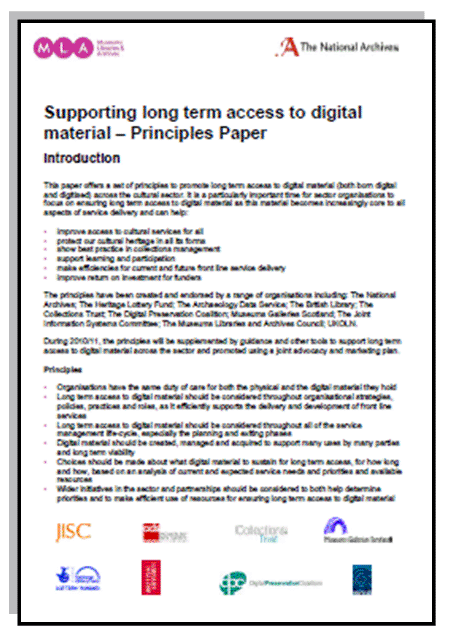Your Digital Legacy
Posted by Marieke Guy on 31st January 2011
Personal Legacy
Last week Law.Com published an interesting article entitled What Happens to Your Digital Life When You Die?.
The article, written by Ken Strutlin, starts by explaining that the dealing with our digital legacy is something the legal world has yet to get to grips with.
“Still, one of the neglected ensigns of internet citizenship is advanced planning. When people die, there are virtual secrets that follow them to the grave — the last refuge of privacy in a transparent society. Courts and legislatures have only begun to reckon with the disposition of digital assets when no one is left with the knowledge or authority to conclude the business of the cyber-afterlife.“
It is an immensley complicated area and “the most important long-term consideration is who can access a person’s online life after they have gone or become incapacitated?“. Many people can leave behind a huge amount of digital data. Much of this, for example images and documents, may no longer be sat on a local hard drive but may be out there stored on cloud services such as Flickr and Facebook. It is likely that loved ones will be keen to be able to access and collate this data.
Information on both legal rights and what physically needs to be done is becoming increasingly important.
A few years ago a colleague of mine passed away and after some time I took it upon myself to notify Facebook. Relatives had initially posted some information (such as funeral details) up on my colleague’s wall but no other action had been taken. The profile had remained as one of a living user. After I contacted them Facebook acted quickly and effectively and memorialized the account. It is quite clear that they have a well thought out set of procedures in place.
Work Legacy
At UKOLN where I work we have touched on this subject when considering how you deal with the digital legacy of staff who move on. Although former members of staff are not ‘dead’ the problems that their leaving causes can be similar to those when someone dies – unknown passwords and use of unlisted services, to name two. In the past this type of information has been described as corporate or organisational memory and has often been subdivided into explicit and tacit knowledge. Recording corporate knowledge, especially the tacit type, has always caused problems, but the digital nature of resources now adds another level.
Strutlin offers a recount of the tale of the Rosetta stone, whose meaning was originally lost but then rediscovered when a Napoleonic soldier found a triptych in the Egyptian town of Rosetta which offered meanings for the hieroglyphics. Strutlin’s response is that “We need more than serendipity to preserve the data of our lives beyond our lifetimes“.
Over time it is likely that laws will emerge and processes and procedures will evolve but we need to be proactive about instigating them.
The principal concern today is the passing on of passwords, divvying up social media contents, and protecting virtual assets. But five minutes from now, those social media sites will include life logged metrics with excruciating details about our health, activities, and collective experiences. They will be more intimate and vivid than any handwritten personal journal or photo album. And they will demand clear and comprehensive rules to oversee their final disposition.
Posted in Web | Comments Off

